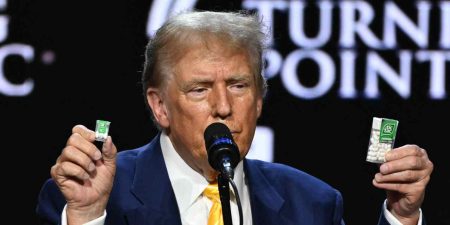By Samuel Indyk and Rae Wee
LONDON (Reuters) -The dollar slid to a more than two-month low on Monday, extending a downtrend from last week as traders reaffirmed their belief that U.S. rates have peaked and turned their attention to when the Federal Reserve could begin cutting rates.
The bottomed out at 103.53 during Asian trade, its weakest level since Sept. 1, extending its nearly 2% decline from last week – the sharpest weekly fall since July.
Against the weaker greenback, the euro hit its highest since August at $1.0937, while the yen firmed at a 5-1/2 week high of 148.63 per dollar.
Markets have priced out the risk of further rate increases from the Fed after a slew of weaker-than-expected U.S. economic indicators last week, particularly after an inflation reading that came in below estimates.
Focus now turns to how soon the first rate cuts could come, with futures pricing in a 30% chance that the Fed could begin lowering rates as early as March, according to the CME FedWatch tool.
“The weakness in the dollar is to do with the moves in rate markets, especially after the November Fed meeting and last week’s CPI,” said Dane Cekov, senior FX strategist at Nordea, although he added that there could be weakness in the dollar in the very short term.
“From a technical perspective, the dollar now looks oversold against the euro, usually you’ll see some sort of consolidation.”
Minutes from the Fed’s latest meeting, released on Tuesday this week, could offer some colour on policymakers’ thinking as they held rates steady for a second time this month.
Sterling edged 0.2% higher to $1.2484, flirting near a two-month peak, while the euro last bought $1.0926 ahead of flash PMI readings in the euro zone due this week and after Moody’s (NYSE:) unexpectedly upgraded the outlook on Italy’s ‘Baa3’ sovereign rating to stable from negative and upgraded Portugal’s rating by two notches to ‘A3’.
Nordea’s Cekov said it should be a positive for the euro area as it should lead to a lower risk premium for Italy and Portugal.
“In that sense it removes some of the downside risk for the euro. That’s my first impression,” Cekov said.
The Japanese yen remained on the stronger side of 150 per dollar and was last 0.7% higher at 148.56.
Elsewhere in Asia, the yuan leapt to a more than three-month high against the dollar in both the onshore and offshore markets, as the central bank guided the unit higher and exporters rushed to convert their dollar receipts into local currency.
The rose 0.5% to an over three-month high of 7.1700 per dollar, while the similarly got a boost and jumped roughly 0.6% to an over three-month top of 7.1703 per dollar.
The was last 0.6% higher at $0.6551, having struck a three-month high of $0.6563 earlier in the session, while the gained 0.6% to $0.6031.
China on Monday left its benchmark lending rates unchanged at a monthly fixing, matching expectations, as a weaker yuan continued to limit further monetary easing and policymakers waited to see the effects of previous stimulus on credit demand.
The yuan, which has fallen nearly 4% against the dollar this year in the onshore market, continues to be pressured by a faltering economic recovery in China and as investor sentiment remains fragile.
“I think the theme of a soft Chinese economic recovery will persist for a while,” said Carol Kong, a currency strategist at Commonwealth Bank of Australia (OTC:).
“Until we get a more meaningful recovery in the Chinese economy, I think that will be a headwind for the (yuan), Aussie and the kiwi in the near term.”
Read the full article here














